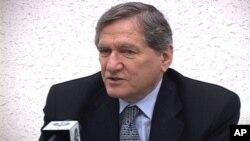The U.S. Special Representative for Afghanistan and Pakistan, Richard Holbrooke, says U.S. and NATO combat forces will be phased out of Afghanistan by the end of 2014 and the handover to Afghan security forces will begin in the middle of next year. Holbrooke's remarks came during a discussion with a group of journalists in Pakistan.
Ambassador Holbrooke acknowledged there is confusion in the region over the U.S. military commitment to Afghanistan.
U.S. President Barack Obama has set July 2011 as the date to begin withdrawing troops from Afghanistan.
However Holbrooke and other American officials are now stressing the combat mission is not likely to end until 2014.
"The substantial combat forces should be phased out at the end of 2014, four years from now. Some withdrawals, the beginning of transition, will occur starting in July of next year and that process will not be completed until the end of 2014."
Ambassador Holbrooke's remarks came on the same day The Washington Post newspaper published an interview with Afghan President Hamid Karzai, who called for the U.S. to reduce the visibility and intensity of its military operations in Afghanistan.
Mr. Karzai said he wants an end to night raids by U.S. Special Operations forces, a key component of the American military's counterinsurgency strategy.
Ambassador Holbrooke says he understands President Karzai wants full sovereignty of the country to be returned to the Afghan people and he says that future goal is shared by the United States.
Holbrooke says, however, tough military measures are required to protect the Afghan people and Mr. Karzai's own government from the Taliban insurgency.
"But in the current circumstances the military actions he is concerned with also are essential to protect his own government and its people. And the balance has to be carefully calibrated on a regular basis and reexamined continually."
Ambassador Holbrooke stressed that U.S. policy to transition security control of areas to Afghan Army forces and police is not what he called an "exit strategy" for the region.
He says America made that mistake before and suffered terrible consequences when terrorists attacked the United States in 2001.
"In 1989, after the Soviet Union left Afghanistan, the United States lost all interest in Afghanistan and turned its back on the region with results that led directly to 9-11 and to the war today. So what I want to be clear on is, we are not going to do that again."
Holbrooke says the American commitment to South Asia is long and enduring.
Some U.S. officials have been putting pressure on Pakistan to do more to fight Taliban and al-Qaida militants in the tribal regions along its border with Afghanistan.
A special focus is on North Waziristan, a mixed cauldron of armed jihadi groups U.S. military officials have called the "epicenter of terrorism."
Pakistan has indicated it will consider mounting a military offensive in North Waziristan, but says its Army is currently stretched too thin.
Ambassador Holbrooke appeared to be sympathetic with Pakistan's concerns.
"On North Waziristan this is a tactical decision that can only be made by the Pakistani Army and they feel they do not have the resources right now and I think they have a point. I hope that this event will take place. This is Pakistan and the United States cannot dictate to the Pakistani military.”
Holbrooke says despite some media reports there are no peace negotiations taking place with the Taliban.
He says there have been some contacts or what he called "talks about talks," but so far, Holbrooke says, there have been no substantial discussions or secret negotiations about reconciliation with Taliban insurgents in Afghanistan.
Holbrooke: US Combat Troops to be Phased Out of Afghanistan by 2014




